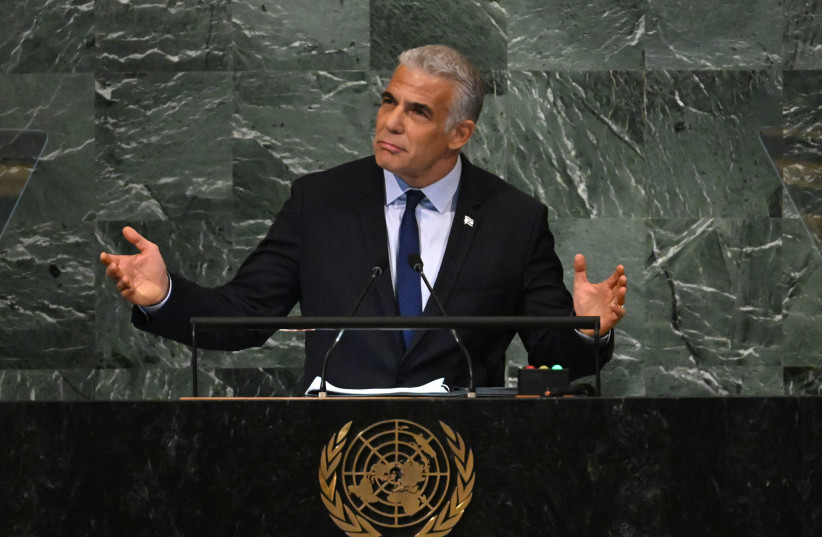“I have not given up on peace. I remain committed to a vision of peace based on two states for two peoples. I believe as never before that changes taking place in the Arab world today offer a unique opportunity to advance that peace.”
Those words were spoken by Benjamin Netanyahu, then Israel’s prime minister, in an address to the United Nations General Assembly in September 2016.
It followed the policy that Israel subscribed to during the previous tenures of Ehud Barak, Ariel Sharon and Ehud Olmert, as a natural outcome of the Oslo Accords and the establishment of the Palestinian Authority.
So, why has there been such a domestic uproar over Prime Minister Yair Lapid making the same declaration to the same international body six years after Netanyahu, the purported guardian of the concept of a Greater Israel, threw his weight behind the two-state solution for Israel and the Palestinians?
Is it because he didn’t mean it and Lapid does? Or maybe it’s because it’s less than two months before the election, and desperate MKs are intent on staking their turf as defenders of Israel.

In his address, Lapid said separating from the Palestinians has to be part of the nation’s vision, but that Israel will not do anything to endanger its security or the security of its citizens.
Former PM Naftali Bennett, who forged a strong working relationship with Lapid, was quick to distance himself from his successor’s statements.
“We need to say clearly: There is no place for another state between the Mediterranean and the Jordan River,” the former prime minister said. “Not just because of our right to the land but also because practically there is no chance of a diplomatic process with the Palestinians succeeding.”
Justice Minister Gideon Sa’ar, from Benny Gantz’s National Unity Party, added his opposition to a Palestinian state, saying, “Establishing a terror state in Judea and Samaria will endanger Israel’s national security. Most of the people in Israel and their representatives will not allow this to happen.”
“Lapid does not have public legitimacy to complicate Israel with comments that will harm the country. Lapid represents only himself, not the government. A Palestinian state is dangerous to the State of Israel.”
Israeli Interior Minister Ayelet Shaked
Interior Minister Ayelet Shaked, who is in danger of not passing the 3.25% electoral threshold in November, tweeted, “Lapid does not have public legitimacy to complicate Israel with comments that will harm the country. Lapid represents only himself, not the government. A Palestinian state is dangerous to the State of Israel.”
The reactions to Lapid’s UN speech have less to do with the content than with the contenders on the Right side of the political spectrum fighting for their constituents’ votes and trying to look tough.
Lapid as well, with an eye on the coming election, is trying to present himself as the level-headed purveyor of Israeli policy with whom the Jewish state’s friends at the UN can live. And knowing that UNGA speeches are primarily designed for a domestic audience, he’s also exploiting the high-profile gift he’s been given to stake his own turf for the elections.
The faux outrage against Lapid for stating something that has been Israeli policy for decades is politics as usual. It also shows the continued absence of substance from the parties and candidates running for office.
You reject a two-state solution? What is your plan?
The changes in the Arab world to which Netanyahu alluded in 2016 have indeed come to fruition in the intervening years. The Abraham Accords have opened previously closed doors and made normalization with the Arab world a work in progress that was previously unthinkable.
However, mostly due the continued failure of leadership on the Palestinian side, there has not been progress on the Israeli-Palestinian track that was hoped for at the time the Abraham Accords were signed.
A two-state solution, which continues to be the preferred resolution to our struggles here, is very far off and impossible to implement today. But just as Israel is here and not going anywhere, so are our neighbors.
Lapid is simply stating the obvious. But because no Israeli leader has made that declaration in the last few years, and because the desperate politicians fighting for votes from the same constituency have their knives out, it’s politically expedient to attack what has long been Israeli policy.
Instead of their fake outrage, Lapid’s detractors should be busy presenting their own vision of getting out of our long, ongoing morass.
